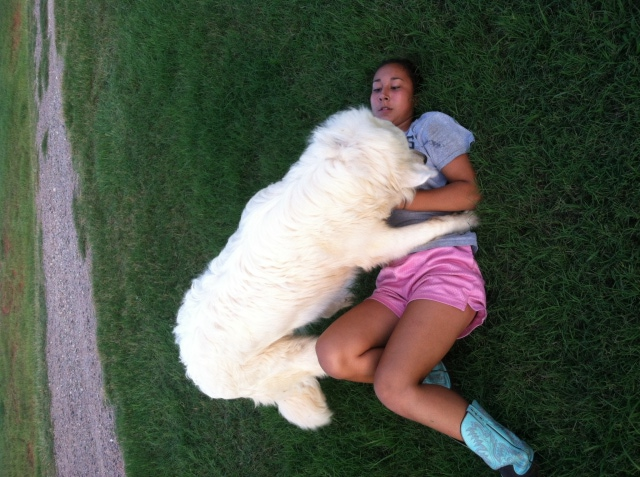QuestionHi! My dog is 7 yrs. old, a female Australian shepherd. We've had her since she was a puppy. She's mostly an inside dog. She was eating IVD dog food, but about 2 weeks ago, I had to change her from that to only people food (shredded chicken breast with some cooked potato, etc.). She's been having diarrhea of and on for months,though now it's mild, but every day. I thought it might be food allergies, so have tried changing her do food a few times(none of the food was a recalled brand). None of the changes made a difference. Now she's begun vomiting regularly (twice yesterday), once a day usually. The shade of her undercoat has a very, very slight reddish tone that I've noticed for the last several months, which was not there before. She was on an NSAID (for 2 weeks) from the vet for some arthritis in the lumbar region (she squeals due to pain if we pet her there). About 2 weeks ago, we abruptly discontinued the med because when she came into our house after we let her out to go to the bathroom, her entire rear end was covered in bright red blood. The most obvious reason the vet considered was that it could have been from the NSAID (the drug was discontinued at this time). After this bleeding, she would not eat or drink for 2 days, so I had to take her to the vet for an IV for rehydration one time. She has been eating and drinking normally since then(eating only people food, because would not eat dry IVD).There's been no obvious bleeding since then. Her activity level has declined significantly in the last few months, but it's hard to tell if it's just from the back pain. She's on no other meds or supplements at the moment, as we are trying to discern what is her health problem. She has been on glucosamine with chondroitin for a while up until the last few days. She is spayed. I am taking her to the vet today for lab work. Do you have any ideas about what's going on, including what lab work I could request? We're planning to check her liver and pancreas via lab work. I would not say her drinking or urination have increased. Thank you so much.
AnswerIn humans, NSAID drugs can cause stomach and esophageal ulcers, which can lead to bloody diarrhea and/or vomiting, and loss of appetite. Has your vet thoroughly checked her to rule out those possible problems?
May I ask why she was on IVD food to begin with? Was it because of the off and on diarrhea that she'd been suffering from for the past few months? What was she on before? You aren't adding any spices or anything to her homecooked meals now, are you?
Poor girl; I feel bad for her, because she shouldn't be in such bad shape at only 7 years of age. :^( It sounds like you're doing all you can for her, and aside from asking the vet about checking for an ulcer, I don't know what else to suggest. I would imagine that the decline in her activity level is most likely due to the pain she's experiencing. One thing you could try, to see if it helped her any, would be to start giving her fish oil and vitamin E every day. Fish oil is beneficial in SO many ways, including having anti-inflammatory properties. If you have a Sam's Club in your area, you can get a big bottle of fish oil gelcaps and one of vitamin E. Make sure, with the fish oil, that it's not *liver* oil, and that you get the kind that does NOT have an enteric coating, because dogs cannot break that coating down. Get the one that contains 1200iu of oil in each gelcap. If you can, get the 'natural' vitamin E (which is d-alpha tocopherol, NOT dl-alpha tocopherol). It's slightly more expensive, but is not chemical, like the dl-alpha is. Give her 1 vitamin E gelcap and 3 fish oil gelcaps daily. Vitamin E and fish oil should be given together because they work in conjunction with one another. If she won't take the gelcap as a treat, you can poke a hole in them and squeeze out the oil into her food after you put it in her bowl.

 aggressive kids and dogs
QuestionI have a hyper aggressive 6 yr old who always p
aggressive kids and dogs
QuestionI have a hyper aggressive 6 yr old who always p
 Vicious fighting between two females
Question
Alice and Julia
I have two female rescue dogs
Vicious fighting between two females
Question
Alice and Julia
I have two female rescue dogs
 Great Pyrenees
Question
Shirley
We adopted Great Pyrenees femal
Great Pyrenees
Question
Shirley
We adopted Great Pyrenees femal
 Senior dog not eating
Question
Meggie Girl
I will be so grateful if you can h
Senior dog not eating
Question
Meggie Girl
I will be so grateful if you can h
 Growth on dogs right foreleg
Question
Foreleg 1 Foreleg 2
Hi Gary,
Our
Growth on dogs right foreleg
Question
Foreleg 1 Foreleg 2
Hi Gary,
Our